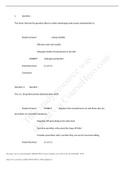NSG6005 (NSG6005)
South University
Page 2 out of 30 results
Sort by
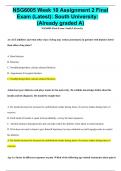
-
NSG6005 Week 10 Assignment 2 Final Exam (Latest): South University: (Already graded A)
- Exam (elaborations) • 36 pages • 2023
-
- $16.99
- + learn more
NSG6005 Week 10 Assignment 2 Final Exam (Latest): South University: (Already graded A) NSG6005 Final Exam: South University An ACE inhibitor and what other class of drug may reduce proteinuria in patients with diabetes better than either drug alone? A. Beta blockers B. Diuretics C. Nondihydropyridine calcium channel blockers D. Angiotensin II receptor blockers C. Nondihydropyridine calcium channel blockers Adam has type I diabetes and plays tennis for his universit...
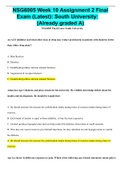
-
NSG6005 Week 10 Assignment 2 Final Exam (Latest): South University: (Already graded A)
- Exam (elaborations) • 36 pages • 2022
-
- $11.49
- + learn more
An ACE inhibitor and what other class of drug may reduce proteinuria in patients with diabetes better than either drug alone? A. Beta blockers B. Diuretics C. Nondihydropyridine calcium channel blockers D. Angiotensin II receptor blockers C. Nondihydropyridine calcium channel blockers Adam has type I diabetes and plays tennis for his university. He exhibits knowledge deficit about his insulin and his diagnosis. He should be taught that: A. He should increase his incr...
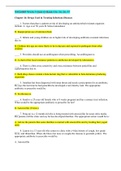
-
NSG6005 Week 3 Quiz Q Bank Ch: 24, 26, 37
- Exam (elaborations) • 6 pages • 2022
-
- $10.00
- + learn more
Chapter 24: Drugs Used in Treating Infectious Diseases ____ 1. Factors that place a patient at risk of developing an antimicrobial resistant organism include: A. Age over 50 years B. School attendance D. Inappropriate use of antimicrobials ____ 2. Infants and young children are at higher risk of developing antibiotic-resistant infections due to: B. Children this age are more likely to be in daycare and exposed to pathogens from other children ____ 3. Providers should use an antibiogram w...
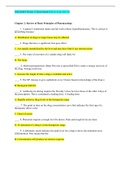
-
NSG6005 Week 2 Quiz Bank Ch: 2, 5, 6, 10, 13
- Exam (elaborations) • 12 pages • 2022
-
- $13.00
- + learn more
Chapter 2: Review of Basic Principles of Pharmacology ____ 1. A patient’s nutritional intake and lab work reflects hypoalbuminemia. This is critical to prescribing because: A. Distribution of drugs to target tissue may be affected ____ 2. Drugs that have a significant first-pass effect: C. Are rapidly metabolized by the liver and may have little if any desired action ____ 3. The route of excretion of a volatile drug will likely be: B. The lungs ____ 4. Medroxyprogesterone (Depo P...
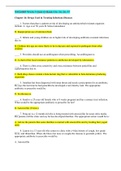
-
NSG6005 Week 3 Quiz Q Bank Ch: 24, 26, 37
- Exam (elaborations) • 6 pages • 2022
-
- $10.00
- + learn more
Chapter 24: Drugs Used in Treating Infectious Diseases ____ 1. Factors that place a patient at risk of developing an antimicrobial resistant organism include: A. Age over 50 years B. School attendance D. Inappropriate use of antimicrobials ____ 2. Infants and young children are at higher risk of developing antibiotic-resistant infections due to: B. Children this age are more likely to be in daycare and exposed to pathogens from other children ____ 3. Providers should use an antibiogram w...
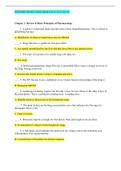
-
NSG6005 Week 2 Quiz Bank Ch: 2, 5, 6, 10, 13
- Exam (elaborations) • 12 pages • 2022
-
- $13.00
- + learn more
Chapter 2: Review of Basic Principles of Pharmacology ____ 1. A patient’s nutritional intake and lab work reflects hypoalbuminemia. This is critical to prescribing because: A. Distribution of drugs to target tissue may be affected ____ 2. Drugs that have a significant first-pass effect: C. Are rapidly metabolized by the liver and may have little if any desired action ____ 3. The route of excretion of a volatile drug will likely be: B. The lungs ____ 4. Medroxyprogesterone (Depo P...
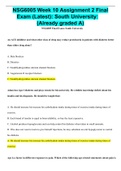
-
NSG6005 Week 10 Assignment 2 Final Exam (Latest): South University: (Already graded A)
- Exam (elaborations) • 36 pages • 2022
-
- $10.00
- + learn more
NSG6005 Week 10 Assignment 2 Final Exam (Latest): South University: (Already graded A) NSG6005 Final Exam: South University An ACE inhibitor and what other class of drug may reduce proteinuria in patients with diabetes better than either drug alone? A. Beta blockers B. Diuretics C. Nondihydropyridine calcium channel blockers D. Angiotensin II receptor blockers C. Nondihydropyridine calcium channel blockers Adam has type I diabetes and plays tennis for his universit...
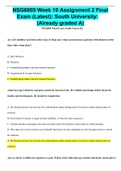
-
NSG6005 Week 10 Assignment 2 Final Exam (Latest): South University: (Already graded A)
- Exam (elaborations) • 36 pages • 2022
-
- $10.39
- + learn more
NSG6005 Week 10 Assignment 2 Final Exam (Latest): South University: (Already graded A) NSG6005 Final Exam: South University An ACE inhibitor and what other class of drug may reduce proteinuria in patients with diabetes better than either drug alone? A. Beta blockers B. Diuretics C. Nondihydropyridine calcium channel blockers D. Angiotensin II receptor blockers C. Nondihydropyridine calcium channel blockers
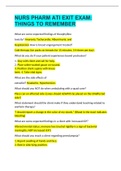
-
ATI EXIT EXAM NURS PHARM: THINGS TO REMEMBER
- Exam (elaborations) • 9 pages • 2021
-
- $9.98
- + learn more
NURS PHARM ATI EXIT EXAM: THINGS TO REMEMBER What are some expected findings of theophylline toxicity? Anorexia, Tachycardia, Albuminuria, and Hypotension How is breast engorgement treated? Cold therapy (ice packs on breasts for 15 minutes, 3-4 times per day). What do you do if your patient experiences bowel protrusion? 1. Stay with client and call for help. 2. Place saline-soaked gauze on wound. 3. Position client supine with knees bent. 4. Take vital signs. What are the side effects of ...
NSG6005 QUIZ COLLECTION - Week1, Week2, Week3, Week4, Week5, Midterm and Final Exam Review all GRADED A

How did he do that? By selling his study resources on Stuvia. Try it yourself! Discover all about earning on Stuvia



